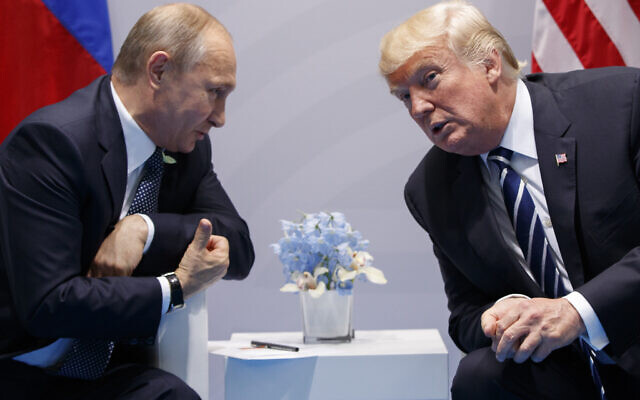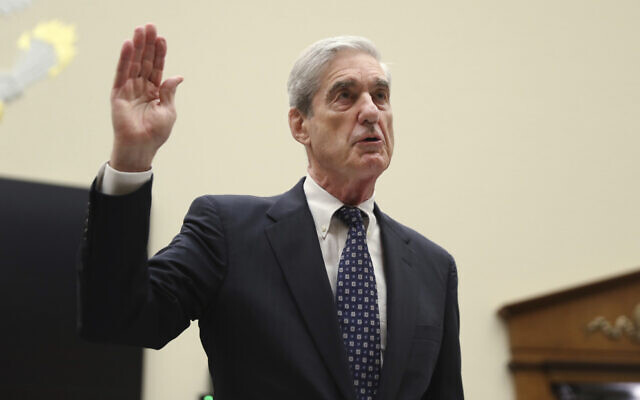AP — The Justice Department under Attorney General William Barr improperly withheld portions of an internal memorandum Barr cited in publicly announcing that then-President Donald Trump had not obstructed justice in the Russia investigation, a federal appeals panel said Friday.
The department had argued that the 2019 memo represented the private deliberations of its own lawyers before any decision had been formalized, and was therefore exempt from disclosure. A federal judge previously disagreed, ordering the Justice Department to provide it to a government transparency group that had sued for it, prompting an appeal last year by the Biden administration to a higher court.
Attorneys for the Justice Department didn’t immediately respond to an email message seeking comment. The department can appeal the ruling — by a panel of judges from the US Court of Appeals for the District of Columbia Circuit — to the full appeals court.
At issue in the case is a March 24, 2019, memorandum from the head of the Justice Department’s Office of Legal Counsel, or OLC, and another senior department official that was prepared for Barr to evaluate whether the evidence in special counsel Robert Mueller’s investigation could support the prosecution of the president for obstruction of justice.
Barr has said he looked to that opinion in concluding that Trump did not illegally obstruct the Russia probe, which was an investigation of whether his campaign had colluded with Russia to tip the 2016 election.
Get The Times of Israel's Daily Edition by email and never miss our top stories
The Justice Department turned over other documents to Citizens for Responsibility and Ethics in Washington as part of the group’s lawsuit but declined to give it the memo. Government lawyers said they were entitled under public records law to withhold the memo because it reflected internal deliberations among lawyers before any formal decision had been reached on what Mueller’s evidence showed.

US President Donald Trump, right, meets with Russian President Vladimir Putin at the G-20 Summit in Hamburg, Germany, July 7, 2017. (AP/Evan Vucci, File)
But US District Judge Amy Berman Jackson said last year that those arguments were disingenuous because the memo was prepared for Barr at about the same time as a separate Justice Department letter informing Congress and the public that Barr and other senior department leaders concluded that Trump had not obstructed justice.
The memo noted that “Mueller had declined to accuse President Trump of obstructing justice but also had declined to exonerate him” and “recommended that Barr ‘reach a judgment’ on whether the evidence constituted obstruction of justice,” the panel wrote Friday. The memo also noted that “the Report’s failure to take a definitive position could be read to imply an accusation against President Trump” if the confidential report were released to the public, the court wrote.
In his letter to Congress, the court noted, Barr stated that his “determination was made without regard to, and is not based on, the constitutional considerations that surround the indictment and criminal prosecution of a sitting president.”
In the portions of the memo that were released, the appellate panel wrote, Justice Department officials “redacted references to a constitutional bar on prosecuting a sitting President,” including “the caveat that the memorandum’s recommendation would apply only ‘were there no constitutional barrier’ to prosecution” — meaning after Trump’s time in office had concluded.

Former special counsel Robert Mueller is sworn in before he testifies before the House Judiciary Committee hearing on his report on Russian election interference, on Capitol Hill, in Washington, July 24, 2019. (AP Photo/Andrew Harnik)
Therefore, the panel wrote, the Justice Department didn’t initially disclose “that the memorandum’s analysis assumed President Trump could not be charged with a crime while in office.”
Instead the department, like Mueller, “took as a given that the Constitution would bar the prosecution of a sitting president,” the court wrote, noting that the fact that the decision had already been made meant it didn’t qualify for the protection from public release for which Justice had argued.
The government said it had indeed already concluded that there would be no obstruction prosecution since Justice Department legal opinions say a sitting president cannot be indicted. But it said the memo concerned a separate issue: whether the evidence Mueller had collected could support a conclusion that Trump had obstructed justice.
In its ruling Friday, the appellate panel wrote that, had Justice Department officials made clear to the court that the memo related to Barr’s decision on making a public statement about the report, rulings in the case might have been different.
“Because the Department did not tie the memorandum to deliberations about the relevant decision, the Department failed to justify its reliance on the deliberative-process privilege,” according to the ruling, by an unsigned panel of judges from the US Court of Appeals for the District of Columbia Circuit.
Barr and other senior officials concluded that Trump’s actions didn’t amount to obstruction, and the attorney general shared that assessment with Congress soon after the memo was complete. Mueller’s team did not reach a conclusion on whether Trump had obstructed justice.
Appellate judges also noted that their ruling was “narrow,” saying that it should not be interpreted to “call into question any of our precedents permitting agencies to withhold draft documents related to public messaging.”


